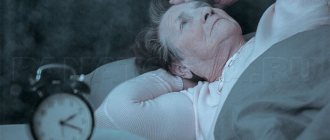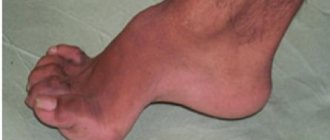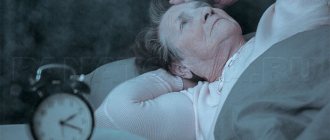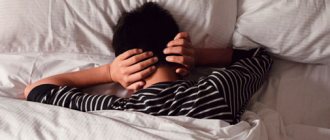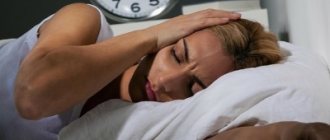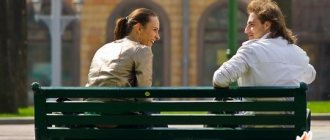Should you worry if you can't sleep? Why is this happening? How can you adjust your lifestyle to ensure healthy sleep? We tell you together with doctors who deal with sleep disorders.
Insomnia refers to various phenomena: difficulty falling asleep, systematic awakenings in the middle of the night and inability to fall asleep again, shallow sleep. This problem plagues about a third of the world's population. Chronic insomnia, lasting more than a week, always leads to a sharp deterioration in the quality of life, decreased performance, and drowsiness during the day.
Causes and symptoms of insomnia in old age
With age, the body of older people undergoes changes associated with the central nervous system, which also changes due to the influence of various chemical reactions on it. The number of inhibitory neurons decreases, which leads to sleep disturbances. The situation is aggravated by the fact that nerve cells also become less active, and the production of melatonin, which is a sleep hormone, slows down.
We recommend
“How to care for a bedridden elderly person” More details
There are situations in which consciousness does not turn off to the required depth, as a result, an elderly person may often awaken. Sometimes sleep at night disappears completely.
Causes of insomnia and sleep problems that occur in older people include:
- Negative habits. This category includes cases when the usual sleep schedule is disrupted, the TV is turned on, and alcoholic beverages are consumed immediately before going to bed. It is necessary that the environment in the room be calm and quiet, it is important to follow rituals that promote falling asleep, and turn off the lights.
- Diseases. There are a fairly large number of health problems that cause insomnia in old age: frequent urination, arthritis, asthma, diabetes, osteoporosis, night heartburn, Alzheimer's disease. In such situations, you should get medical advice: a specialist will give recommendations on what exactly should be done.
- Menopause and postmenopause. These conditions often cause hot flashes and night sweats, which contribute to interrupted sleep. However, difficulties with sleep may persist even after menopause. The solution to this problem can be diet and exercise.
- Medications. Elderly people have to take a lot of medications, one of the side effects of which is deterioration in well-being. In this case, it is necessary for the doctor to adjust the dosage or regimen of medications.
- Lack of physical activity. When there is no place for sports in a person’s lifestyle, the severity of sleep-wake cycles is disrupted. In addition, problems often arise with falling asleep, or, on the contrary, an elderly person wants to sleep a lot during the day. Regular aerobic exercise will significantly improve your sleep.
- State of stress, depression, chronic anxiety, restlessness. When serious, tragic events occur, such as the death of a relative, stress can develop. In such a situation, it is important to have someone nearby with whom you can have a heart-to-heart talk.
- Inactive social position. When a person is engaged in social activities, surrounded by family and work, his activity level is maintained at the required level, which helps the body prepare for night sleep. After retirement, older people who want to remain active should devote time to their education and find a hobby.
- Sleep disorders. We are talking about the so-called restless legs syndrome or breathing disorder during sleep (snoring, apnea). Often all this occurs in older people. Only a doctor can solve the problem.
- Lack of sunlight. Thanks to bright sunlight, the body regulates melatonin and the cycles of sleep and wakefulness. For this reason, it is important that older people get at least two hours of light per day. For this purpose, it is recommended to leave curtains open. You can also buy a special device for home that is involved in light therapy.
Also, insomnia in older people occurs due to:
- dysfunction of the thyroid and/or pancreas;
- somatic diseases, mainly: problems with the heart, liver, kidneys, respiratory system and gastrointestinal tract;
- mental and neurological disorders, namely: senile dementia, depression, psychoses, neuroses;
- presence of excess body weight, etc.
Insomnia can be chronic or short-term. In both cases the symptoms are similar:
- sleep duration is significantly reduced;
- falling asleep causes problems and lasts about 45 minutes;
- in the morning there is a feeling of fatigue;
- at night a person often wakes up and finds it difficult to fall asleep;
- increased sensitivity to all kinds of irritants, an elderly person wakes up at the slightest sound.
This condition can last for more than one week. When, over time, the situation does not return to normal, it makes sense to talk about very serious pathological problems associated with sleep, and this, in turn, necessitates the treatment of sleep disorders in older people.
Recommended articles on this topic:
- Boarding home for the elderly: features and rules of choice
- Low blood pressure in older people: causes, symptoms and treatment
- Health of the elderly: old age is not a problem
What is insomnia
Insomnia, or in medical language - insomnia, is considered to be any deviation from normal sleep. Frequent awakenings in the middle of the night, prolonged (up to several hours) falling asleep and difficult awakenings, prolonged absence of sleep at night, shallow sleep - all this is considered to be manifestations of insomnia. Everyone has had periods in their life when they experienced the effects of insomnia on themselves. She especially likes to come before an important event, on the eve of a celebration or exam, when a person is making an important decision in life, to young mothers who hear the slightest rustle of the baby.
More often than not, insomnia is a byproduct of our nervous system, which is known to be unstable, especially in today's pace and lifestyle. The disease can have several types of manifestation.
Presomnia type of disorder
Characterized by prolonged falling asleep. At this time, a person experiences a physical need for rest, feels the desire to fall asleep, but cannot do this. The norm for falling asleep is 5-15 minutes. If after this time sleep has not occurred, we can talk about manifestations of insomnia. This is usually associated with neuropsychological disorders and occurs on the eve of exciting events or after important events. It occurs very often and usually goes away on its own as the emotional state improves.
Intrasomnic disorders
With this type of insomnia, sudden awakenings at night occur, followed by difficulty falling asleep or a complete lack of further sleep. This type of disorder makes sleep superficial, reminiscent of a normal nap and sensitive, when the sleeper is able to wake up from the slightest rustle. Insomnia in this case is caused by emotional swings, experiencing unpleasant events, mental disorders, sleep apnea and self-snoring, systemic diseases (thyroid gland, diabetes mellitus).
Postsomnia disorders
This type is even more common than the first. Its main symptom is a lack of strength and desire to open your eyes, a long awakening, weakness and fatigue even after a whole night of restful sleep. A person suffering from this type of insomnia feels drowsy throughout the day and fails when trying to replenish energy and fall asleep. In addition to psychological reasons, in this case there may be a deficiency of vitamins and minerals, late going to bed, blues and emotional stress. Usually, with this disorder, a person easily falls asleep and sleeps soundly at night, but waking up in the morning causes negative emotions and physical impotence.
But before diagnosing insomnia, it is worth assessing your habits, current state of affairs, and emotional state. Often the reason may lie on the surface.
Which doctor should I consult for insomnia in old age?
Many people wonder which specialist they should contact if they experience insomnia. Often, getting rid of such an unpleasant condition is done by a psychotherapist, but the participation of other experts is also possible.
What information on the topic of how to deal with insomnia in old age can you get from specialists? After diagnosis, the cause is established and a treatment regimen is determined. The doctor takes into account individual aspects related to the older person’s health, including existing illnesses and other factors. It is important to understand that one of the main features is precisely old age, which must be taken into account first. Some patients need to adjust the regimen and dosage of certain medications.
There are situations when, first, an elderly person needs the help of a therapist who will conduct an initial examination and then tell him which doctor to see. Often, advice from a psychologist is effective for insomnia in old age. If you need prompt assistance, then you should turn to the services of specialists from paid clinics, which, by the way, offer discounts for pensioners. As soon as a problem arises, you should immediately make an appointment with a doctor, otherwise insomnia will become chronic.
We recommend
“Interests of older people: how to improve the life of a pensioner” Read more
We call this dream a song
“Everyone already knows: if there is an ambulance near the conservatory, it’s coming to me,” says Lyubov Lvovna.
She is 52 years old. She devoted 48 years to music, and 29 to the fight against insomnia. She once took part in concerts, but due to insomnia she moved to the position of manager of concert halls, and now works at the conservatory. “In my youth, I could sleep in any condition - sitting, standing. Until a night without sleep happened in 1992. I still remember that first sleepless night. I was 23 years old, and like a stupid girl, I knocked on my mother’s door and burst into tears: “Mom, I can’t sleep.” My mother never went to the doctors, there were almost no pills at home, and no attention was paid to insomnia: well, anything can happen. Years later, I analyzed what could have been the cause: there was an unhappy love, even before that we went to the gym from the conservatory and there we hung upside down on a rope... I think if we had immediately gone to the doctors then, there would have been some effect .
A year later, I already had two days in a row without sleep. I started to get scared. I realized that something terrible was happening. And my mother took me to a psychoneurological hospital. The psychiatrist prescribed me a “cocktail” of drugs. But no one tried to find out the reason. At that moment, the medications helped me fall asleep. But this couldn’t last forever...
Collage: Anna Lukyanova
Lyubov Lvovna decided to undergo a full examination. What was happening was reminiscent of an episode of House, only everything was in reality, and the medical detective was in no way approaching the denouement. At one time it was believed that the cause was a nodule on the thyroid gland, but the hormones were fine; diagnosed with depression. Lyubov Lvovna did not believe in depression. “I said: “Give me one night of sleep, and I’ll set the whole city on fire, everyone will have fun.” I still do. Sleep for one night - humor will be beyond all praise. It will be possible to work as a clown,” says Lyubov Lvovna.
But then - a series of sad and tragic circumstances: in the sixth month of pregnancy: separation from the child’s father, health problems in the newborn baby and, worst of all, the death of Lyubov Lvovna’s mother from cancer. And all this against the backdrop of an ongoing search for salvation from insomnia. “I was left completely alone in the whole world,” recalls Lyubov Lvovna. “It became scary because I had to control everything myself.” I went to another psychoneurological hospital. I was diagnosed with depression again, I didn’t believe it again, I didn’t take the pills that were prescribed for sleep. As a result, I didn’t sleep, an ambulance came every night: my blood pressure was high, my heart wasn’t functioning well - well, of course, you can’t sleep that much. When five doctors said it was very similar to depression, I finally believed it.”
Lyubov Lvovna was treated for depression, but this did not become a final victory over the disease. At the same time, she had problems with the thyroid gland; in 2021, she had the node removed. “I thought that the reason for my insomnia was him, and I clearly understood that now I would sleep,” says Lyubov Lvovna. “And at first I finally fell asleep on my own.” But when I fell asleep, I began to be “thrown out” of sleep screaming. I recorded this on my phone. These are screams, as if they were sticking a knife into you, as if they were inserting a defibrillator... I brought the recording to the doctor: in 38 minutes I fell asleep six times and woke up screaming six times. I simply don’t have the money for polysomnography, for overnight video EEG, or for treatment from some outstanding specialists: I need to take out a loan and, most importantly, I need to try to fall asleep with a bunch of sensors. This is an impossible task for a person who does not sleep in his usual environment. I wrote to famous doctors on TV, tried traditional medicine, but there was no result anywhere.
Collage: Anna Lukyanova
I am still sure: I have some physical reason, blood vessels or neck. I should go for a CT scan soon - I hope this will help me understand. I was told that I had problems with my vertebral arteries. I'm glad at least that there is such a diagnosis. The doctor said that theoretically this could be the cause of insomnia.”
Olga Moiseeva from Crimea has a similar story: after two and a half years of struggling with insomnia, she had to leave her job in advertising, and the problem began in the same way, one might say, for no apparent reason. “I encountered insomnia in May 2021,” Olga recalls. “I didn’t sleep for four nights in a row.” I immediately notified everyone at work that there was no sleep and I would work as best I could. Fortunately, the work is sedentary and not related to finance. At first, everyone said that this happens and that, they say, you’ll sleep off tomorrow... But no. Naturally, work became more and more difficult. To be honest, I still don’t understand how I coped. The third night had already become a nightmare, and on the fifth day, in tears, I ran to the neurologist for prescriptions.” Olga doesn’t know the specific preconditions: there were no severe stresses. There was an unsuccessful IVF, but Olga doubts that this could have been the reason.
Olga Shabutdinova from the Moscow region, on the contrary, knows what triggered the illness: “At night, after severe stress, I couldn’t sleep at all. Of course, the next day at work I felt bad, I just waited for the evening to sleep. But the next night passed without sleep, with a terrible feeling of causeless anxiety. I went to the pharmacy, bought over-the-counter sedatives and before going to bed I realized that I was afraid to go to bed and spend another night like this. After a week of such torment, I could no longer sit quietly in a chair at work. My colleagues, of course, noticed my condition, but I didn’t want to tell anything at all.”
Medications for insomnia in old age
A doctor can prescribe medications for insomnia in old age only when it becomes clear why sleep problems arose. The treatment regimen for insomnia caused by one or another somatic disease involves eliminating this disease itself. Sleeping pills can be used in addition to the main therapy.
When sleep becomes impossible due to painful sensations, it is important to undergo a full examination, find the cause and begin the necessary treatment.
Sleeping pills should be taken only in situations where insomnia cannot be eliminated in any other way.
However, even in this case, taking medications should be considered carefully, because sleeping pills have many negative effects, including:
- development of addiction;
- short-term effectiveness;
- side effects;
- negative impact on overall well-being;
- relaxing effect on muscles, which can lead to injuries and falls.
Before purchasing medications, it is better to try to cope with insomnia in other ways, including relaxation or autogenic training.
Often, therapists prescribe second- and third-generation hypnotics to patients. Based on the duration of action, they are divided into 3 groups:
- Medicines that have a short period of action, lasting up to 6 hours. These remedies can eliminate anxiety and make the process of falling asleep easier.
- Medications with an average duration of up to 12 hours. Taking such medications helps you fall into deep sleep and solve the problem of frequent awakenings at night.
- Medications that have a long-lasting effect exceeding 12 hours. Such drugs significantly improve the sleep of older people. But it is worth remembering the side effect, which is expressed in drowsiness that does not go away even after waking up.
You should not take these medications for a long period of time.
At the same time, there are drugs whose use is associated with certain situations:
- Antidepressants are to some extent an alternative to sleeping pills. Usually prescribed in cases where insomnia in old age is associated with a depressive state.
- Neuroleptics are usually prescribed when dementia or mental disorders that accompany insomnia are detected.
It is important to remember a few more important aspects:
- People over 60 often suffer from early awakening, and not only try to solve problems with falling asleep. In this state of affairs, short-acting drugs will be powerless.
- Since metabolism slows down with age, older people are prescribed medications in reduced dosages.
In any case, the decision is made solely by the doctor, who will comprehensively consider each specific case.
1. Drugs by prescription only.
Medications that are often prescribed to older people who have sleep problems include:
- Andante.
The medicine is available in capsule form and has a hypnotic, sedative, and muscle relaxant effect. Effective in treating severe insomnia, as well as in cases where a person has difficulty falling asleep. You should take the capsule immediately before going to bed. The course should not exceed 14 days.
- Zolpiderm (Sanval).
A sedative sleeping pill in the form of tablets that allows you to prolong phases II, III and IV of sleep. The drug is prescribed in situations where there are difficulties falling asleep and early awakenings occur, when insomnia in old age is situational in nature. The course of treatment lasts 2–3 weeks. If we are talking about transient insomnia, the patient takes the medicine for 2–5 days. When taking the drug for a long time, in order to minimize the risk of developing rebound insomnia, the daily dose must be reduced.
- Zopiclone (Imovan).
Tablets with a sedative effect, prescribed for all types of somnological disorders, including mental disorders. The drugs can prolong sleep, improve its quality, and reduce the number of night awakenings. After taking them, a person does not feel groggy in the morning. Must be taken before going to bed. The duration of the course should not exceed one month.
All medications have a fairly impressive list of adverse reactions and contraindications.
2. Drugs without a prescription. /p>
If you do not have a prescription, you can buy sleeping pills at the pharmacy that do not depress the nervous system.
- Corvalol and Valocordin.
We recommend
“Diapers for adults: sizes, absorbency and other characteristics” Read more
Proven drugs with a similar effect help calm the nerves, relieve spasms and speed up the onset of sleep. With their help, you can eliminate agitation and anxiety, and they are effective in dealing with stress. The duration of the sedative effect continues throughout the day. Can be used in the treatment of insomnia, which has a short-term effect, since two weeks after administration there is a decrease in effectiveness. The active substance is phenobarbital. It should be taken about two to three times a day.
- Tanakan.
A medicine created from an extract of ginkgo leaves. The drug promotes cerebral circulation, having a positive effect on the nervous and cardiovascular systems. This remedy is prescribed to elderly people who have developed insomnia after a stroke. You need to take one tablet three times a day. The duration of the course is 1–3 months.
- Donormil.
Used in the treatment of insomnia that is periodic or transient in nature. The drug helps older people fall asleep and prolong sleep time. Should be taken once a day approximately 30 minutes before bedtime. The duration of the course is up to 5 days.
- Melatonin.
A product of the hormonal spectrum, it contains a sleep hormone obtained artificially. Calms in stressful situations, helps correct the body's biological rhythms. This drug can be used for any type of insomnia; it is also suitable for the treatment of depression and helps improve sleep quality. In the morning, a person does not experience fatigue and lethargy, addiction and dependence do not arise. The course of treatment lasts about 10–20 days, the dosage is determined individually.
It is worth taking into account the fact that medications that are sold in pharmacies without a prescription have their own contraindications and adverse reactions. For this reason, you must carefully read the instructions.
3. Herbal medicines.
These drugs contain natural plant extracts that have a positive effect on sleep, improve the psycho-emotional state, relieve tension, reduce anxiety, which is often the cause of insomnia.
- Motherwort Forte.
This sedative drug is prescribed in cases of severe emotional excitability and increased nervousness. You need to take one tablet in the morning and evening. If older people have stomach problems, they should take the drug with extreme caution.
- Persen.
We recommend
“Adaptation of the elderly: in modern society and boarding homes” Read more
The active components of this medication are extracts of lemon balm and mint. With the help of Persen, older people can fall asleep more easily. This drug has antispasmodic and sedative effects. In case of insomnia, patients need to drink 3 tablets immediately one hour before going to bed.
- Novo-passit.
This medicine is available in tablet form. It contains plant extracts of seven herbs, including valerian, lemon balm, St. John's wort, hawthorn, passionflower, hops, and elderberry. Thanks to the drug, older people are able to calm the central nervous system, relax, and fall asleep faster. Novo-passit is prescribed for mild insomnia. The effect of taking it is noticeable almost immediately. Usually take one tablet three times a day.
- Dormiplant.
Available in the form of tablets with sedative, antispasmodic and hypnotic effects. The composition of the drug includes valerian root and lemon balm leaves. The medicine does not affect performance or reaction speed. It eliminates nervous tension. There is no addiction to the drug. In case of insomnia, elderly people are prescribed 2 tablets, which must be taken 30 minutes before bedtime. If you have liver problems, you should not take the drug.
Medicines made from herbs do not have a large list of adverse reactions, which cannot be said about synthetic medicines. However, herbal preparations are prohibited from being taken for certain diseases. Therefore, in any case, consultation with a doctor is necessary.
4. Homeopathic remedies.
Homeopathic remedies are not dangerous, have no side effects, do not contribute to the development of addiction, and can be taken for a long time. A homeopathic doctor can help you choose one remedy or another. To treat insomnia in older people, the following is prescribed:
- Passidorm.
It has the form of a solution. The drug helps improve sleep when problems with falling asleep are identified and there are frequent awakenings at night. If insomnia is pronounced, then you need to take the drug 10 drops every hour, and then increase the dose to 20 drops three times a day.
- Nervochel.
It is prescribed if there are problems with falling asleep, sleep disturbances, or nervous excitability. This drug can be combined with other drugs. Usually take 3 tablets per day.
- Notta.
This drug must be taken in case of insomnia resulting from anxiety, increased excitability, and mental stress. Notta helps regulate the rhythms of sleep and wakefulness. If the symptoms are very bothersome, then you need to take 10 drops up to 8 times a day, and then 3 times a day.
We recommend
“Gymnastics for the elderly: the best exercises for various diseases” Read more
Consequences of insomnia
Before taking action, it is important to assess the scale of the disaster. Lack of quality sleep and the slightest disturbance lasting from a week to 10 days is not a reason to panic. The episodic nature of disorders of varying sleep duration occurs in everyone. But serious disorders that torment for months become chronic and have consequences.
- Problems concentrating,
- Difficulties with remembering and learning,
- Decreased performance
- Apathy or obsessiveness
- Development of depressive states
- Loss of interest in life
- Irritability and aggression
- Manifestation of somatic diseases
- Chronic fatigue
- Arterial pressure
- Headache
- Disorders of the cardiovascular system
- Excess weight
- Edema
- Deterioration in skin quality and overall appearance
And this is only a small part of the consequences of insomnia, which can be avoided by starting insomnia therapy or its prevention in time. The best remedies for insomnia
Treatment of insomnia in old age with folk remedies
A large number of natural methods help to significantly improve the quality of sleep. Some products can be taken internally and externally. The use of a combined approach helps to achieve a tangible effect in addressing the issue of treating insomnia in old age. However, in any case, it is important to take precautions to prevent negative consequences.
It should be understood that the use of some methods is fraught with changes in blood pressure and can lead to stress on the heart and other internal organs. If you have any somatic diseases, it is important to discuss the choice of one or another non-traditional approach with your doctor.
1. Oral medications.
Targeted drug therapy should be chosen as a treatment only as a last resort. To begin with, it is better to try to solve the problem of insomnia with the help of natural herbal remedies. It is better to take such remedies in courses lasting 2–4 weeks until the symptoms disappear completely.
Effectively helps fight insomnia in older people:
- A decoction with the addition of mint and lemon balm. You need to take one teaspoon of a mixture of these two components, added in equal quantities, and brew it in chamomile tea. The resulting drink should be drunk warm an hour before bedtime.
- A decoction made from hop cones. Pour one tablespoon of ground dried plant material into 400 ml of boiling water (two glasses). After keeping on low heat for three minutes, take one cup after meals in the afternoon. For people over the age of 70, it is better to give preference to the oregano composition, which is prepared according to a similar recipe.
- St. John's wort infusion. You need to prepare this remedy as follows: pour one tablespoon of herbal mass with 3 cups of boiling water. Leave in a thermos for about two hours. Afterwards, the infusion should be strained and taken three times a day in equal proportions, regardless of meals.
Having chosen natural therapy as a treatment for insomnia, it is important to monitor the general condition of the body. If any negative reactions occur, it is possible that there is an individual intolerance to any component included in the drug. Then you should stop taking this remedy and consult a doctor.
2. External means.
Herbal medicines can not only be taken orally, but also used as a basis for physiotherapy.
However, in any case, before carrying out water procedures, it is important to consult a doctor. Elderly people often have many contraindications for such sessions. It is extremely dangerous to start self-medication for those who have hypertension, heart problems, hernias, diseases of the joints and internal organs.
Relaxing baths used to eliminate insomnia:
- Hops with lavender. You will need about 3-5 cones of the plant, which must be poured with one liter of boiling water and left to infuse for one to two hours. Afterwards, you need to filter the resulting infusion and pour it into the bath. In order for the effect to be maximum, it is also recommended to add a few drops of lavender essential oil, previously diluted in one tablespoon of vegetable oil, to the water.
- Milk with linden. Pour two liters of boiling water into two glasses of linden blossom and leave to simmer for three minutes, and then let it brew for two hours. Add the strained product to the bath inlet. A similar mixture can also be prepared with milk for 10 minutes. To do this, the components are taken in equal proportions, mixed, brought to a hot state, but not boiled, but infused for five minutes.
- Coniferous mixture. You can also take cones or branches of various evergreens. It is necessary to add 3 liters of boiling water to two glasses of raw materials and cook over low heat for a quarter of an hour after the mixture boils. Then you can strain the infusion and start using it, or let it brew for two to three hours.
You should stay in such baths for about 10–20 minutes, it all depends on the patient. The temperature should be between 35–37 ℃, otherwise the result will not meet expectations. Sessions must be performed every other day, 30 minutes before bedtime.
We recommend
“Centers for pensioners: what they are and how to get there” Read more
Tablet in hand
When Lyubov Lvovna believed in the diagnosis of depression, she began to see a doctor as a day patient. She recalls: “When the doctor heard my story, he said to me: “How are you holding up? Any healthy man would have collapsed already. You must be very strong.” I deceived the doctor: I took a smaller dose of pills. I gained a lot of weight on this antidepressant and was afraid of gaining even more weight. But at least she started sleeping, and there was no ambulance for six months. I worked on pills, there were concerts. When I came to work, they told me: “My God, what bruises you have under your eyes, how can you still walk.” I can’t say this: I’m getting completely scared, it seems to me that I’m dying.”
“The process of selecting medications is simple,” recalls Olga Moiseeva about her treatment of insomnia. — Doctors have a list of drugs that are used for insomnia (but only for acute insomnia, which does not last long). These drugs are the same for everyone. Some are just weaker, others are stronger. Doctors begin to get confused when the patient says that they have tried everything and there is no point. None of them should be taken for more than a month, and all pills have withdrawal symptoms. They offered sports as an alternative to pills, but it didn’t help me. I worked out two or three times a week, but sleep didn’t always come after training. That is, it turned out that after a sleepless night I went to work, and then to fitness, and I really risked my heart at such moments. My coach told me that I can’t do this. I was also offered cognitive behavioral therapy. But, having found out the price for the session, I was forced to refuse: no guarantees were given, and the price tag for the course was equal to my salary.
Collage: Anna Lukyanova
All the doctors, such as a neurologist, a somnologist, a psychotherapist, cost me a lot of money. All of them are only in private clinics. We don’t treat insomnia for free - a compulsory medical insurance neurologist at the clinic offered me valerian. But, as it turns out, they don’t know how to pay either. Now, while taking vitamins, I feel better, I began to fall asleep on my own. I’m sure that with a problem like insomnia, you need to look everywhere, even where traditional medicine is not used to looking.”
Olga Shabutdinova’s story with insomnia ended in victory over the problem: “I was able to cope with insomnia with medication. My case was not treated with vitamins, teas, meditation, lavender baths... I did not expect to sleep immediately after the appointments. At the beginning of treatment, I took a week off. The antidepressants were taken for about a year. But I was able to sleep normally without tranquilizers after a month and a half. Of course, the doctor cannot always immediately select antidepressants; sometimes this happens the second or third time. It’s very good when during such a period there are people who have gone through this and can support you. My depression and insomnia were partly triggered by moving to another city, so there was no one around.”
How to get rid of insomnia in old age without taking medications
Often, taking sleeping pills does not allow one to cope once and for all with the problem of lack of adequate sleep in older people. According to a number of experts, it is necessary, first of all, to pay great attention to the condition of your body.
Walking in the open air is a great way to prepare for bed. It is important to go to bed at the same time and follow a routine.
To solve the problem of the functioning of the biological clock, you should engage in physical activity. First of all, they are necessary for people who do not lead a very active lifestyle. Even just doing simple exercises will give your muscles the necessary load, which will promote good sleep. Remember that it is better to do exercises in the first half of the day, otherwise the effect will be the opposite, which will lead to overexcitation of the nervous system.
If possible, give up napping during the day: this will make it easier to fall asleep at night.
Pay attention to the air temperature in the bedroom. Try to keep it no more than +21 ° C. Ventilate the rooms daily.
It is important to be able to properly tune in to sleep. The bed should be associated exclusively with sleep; there is no need to read or watch TV in it.
Focus on calming rituals before bed, such as taking a bath, listening to music, using relaxation techniques, and breathing deeply. Each person chooses one or another relaxation technique based on their individual character traits.
When older people are bothered by insomnia, experts advise reconsidering their eating habits. The last meal before bed should be light. Boiled vegetables, meat and low-fat fish are good options. Do not drink drinks containing caffeine a few hours before bed, and do not eat sweets.
Choose orthopedic pillows and a mattress for sleeping; the blanket should be soft.
Adverse habits, including smoking and drinking alcohol, have a negative impact on the quality of sleep.
Exercises for insomnia in old age
If insomnia occurs constantly in an elderly person, it is recommended to perform certain exercises. With their help, it will be possible to improve the functioning of the nervous system and even avoid the need to take any medications.
- Breathing exercises.
It is recommended to perform similar breathing exercises twice every knock for a month. Such gymnastics helps not to think about bad things, relaxes, forming a close relationship that arises between body and soul.
To begin, inhale deeply through your mouth, completely emptying your lungs of air. Then inhale through your nose to the count of 1, 2, 3, 4. You must hold your breath for a count of 7. Then exhale, leaving your teeth clenched. Press your tongue against your teeth until you hear a characteristic whistle.
Breathing exercises should be repeated twice, adding one repetition every day. When you perform gymnastics, you need to take a lying position, paying attention to the work of the abdomen. According to experts, if you count slowly, the effectiveness of the technique increases significantly.
Thanks to breathing exercises, it is possible not only to fight insomnia, but also to eliminate anxiety and get rid of stress. Such exercises are good for people suffering from panic attacks.
- Other exercises.
When considering the question of what to do for insomnia in old age, it is worth mentioning other ways to solve this problem. However, it is important to make time for them every evening.
To begin, lie on your back with your knees bent. Remaining in this position, raise your limbs, fixing them in this position for some time. If you feel tired, place one leg on the bed and then do the same with the other. After 5 minutes, relax your legs.
While lying on your back, lower your arms along your torso, placing your palms on the surface of the bed. As you inhale, tighten your lower back muscles, relaxing them as you exhale. Repeat the exercise 5 times.
While lying down, clasp your fingers behind the back of your head, lift your head and arms, tensing your abdominal muscles. Then return to the starting position. Massage the abdominal cavity, making clockwise movements. Try to be in a relaxed state. Repeat the exercise 6 times.
Methods for preventing insomnia in the elderly
It is worth understanding that not all elderly people can be prescribed drug therapy. The reason is the presence of a large number of serious diseases. Even taking one small sleeping pill can lead to serious consequences. In any case, it is important to avoid situations where the disease has already occurred. To prevent insomnia, doctors suggest the following methods:
- psychotherapy;
- conversations with an elderly person and his loved ones about sleep problems;
- choice of treatment regimen for the underlying disease;
- sleep hygiene training;
- conversations during which it is possible to understand how to improve the quality of life.
Often, fighting a particular disease is not at all easy. However, this is necessary, since it is diseases that most often become provocateurs of insomnia. Elderly people lack the main sleeping pill, namely muscle fatigue. Often, having a lot of free time, they manage to get enough sleep during the day, but by evening their mood deteriorates, heavy thoughts oppress them, and as a result they cannot fall asleep. Only those who have peace of mind, are satisfied with themselves and their lives, have interesting hobbies, and are surrounded by the love and attention of family and friends sleep well.
